







2 Collective IMPACT | Issue 4 2022 YOURMOVEGREENBAY.COM
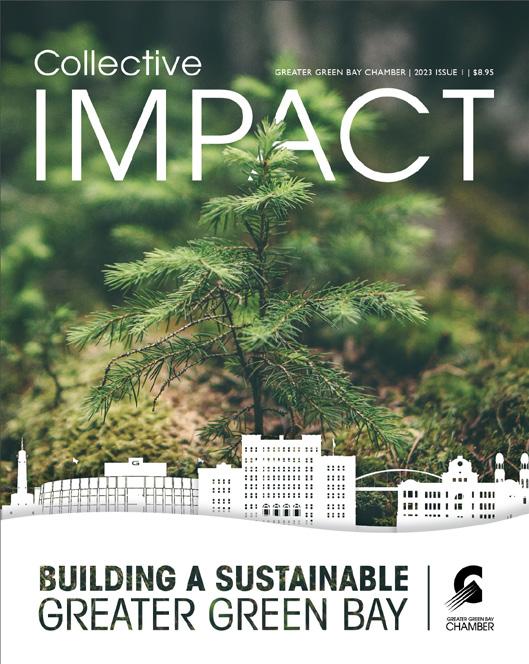


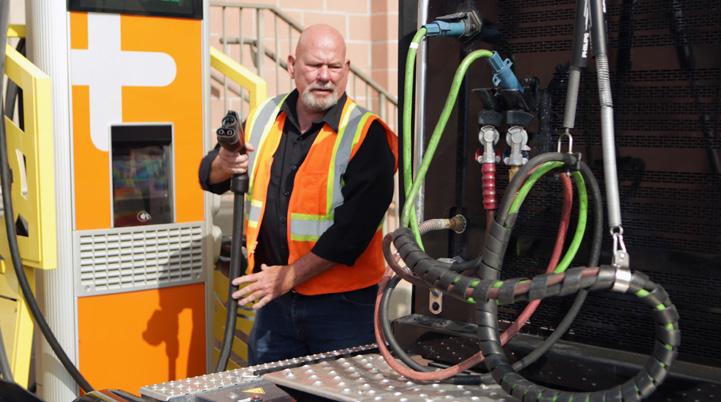
Publisher Laurie Radke, President/CEO, Greater Green Bay Chamber Editor Mary Rhode, Director of Marketing, Greater Green Bay Chamber Human Sustainability 06 Literacy Green Bay, so much more than reading Social Sustainability 08 Local expertise matters when it comes to senior living and care 09 Hello neighbor, my name is ALICE 10 Strategic implementation of the Chamber’s diversity, equity, and inclusion initiatives Economic Sustainability 12 Delivering with purpose 14 Using data and technology to reduce supply chain emissions 15 Electrifying the community: a sustainable future through education Enviromental Sustainability 16 The nature of business 17 Green skies ahead 18 Paper mill leads water stewardship 21 Sanimax and the original recycling industry 20 Chamber events at a glance 21 Chamber member anniversaries Contact: Allison Rodriguez Member Relationship Specialist arodriguez@greatergbc.org 920.593.3423 In Each Issue Advertise with us! On the Cover Cover photo credit: Julie M Gile Photography; JulieMGilePhotography.com Feature - Building a sustainable Greater Green Bay Contents Collective Impact is published quarterly by the Greater Green Bay Chamber, 300 N. Broadway, Ste. 3A, Green Bay WI 54303. Collective Impact is supported by advertising revenue from member companies of the Greater Green Bay Chamber. For information about the advertising rates and deadlines, contact sales at 920.593.3418. Collective Impact (USPS 10-206) is published quarterly for $24 a year by the Greater Green Bay Chamber, 300 N. Broadway, Ste. 3A, Green Bay, WI 54303. Periodicals postage paid at Green Bay, WI. POSTMASTER: Send address changes to Collective Impact, 300 N. Broadway, Ste. 3A, Green Bay WI 54303. PH: 920.593.3423. PRINTER: Solutions in Print Issue 4 2022 | Collective IMPACT 3 10 16 12
$8,612 refund* for your employee health plan? It’s possible with UnitedHealthcare Level Funded Designed for lower costs, Level Funded plans include a potential year-end surplus refund when your plan participant medical claims are lower than expected. In fact, 31.7% of Level Funded plan sponsors in Wisconsin received a health plan refund in 2021, the average of which was $8,612.* *Among the 31.7% of UnitedHealthcare Level Funded plan sponsors in Wisconsin who received a refund in 2021, the average refund was $8,612.86. UnitedHealthcare internal analysis, Jan. 1, 2021 through Dec. 31, 2021. Please consult a tax and/or legal advisor to determine if, by receiving this refund, there are any restrictions or obligations. Surplus refund available only where allowed by law. Administrative services provided by United HealthCare Services, Inc. or their affiliates, and UnitedHealthcare Service LLC in NY. Stop loss insurance is underwritten by All Savers Insurance Company (except CA, MA, MN, NJ and NY), UnitedHealthcare Insurance Company in MA and MN, UnitedHealthcare Life Insurance Company in NJ, UnitedHealthcare Insurance Company of New York in NY, and All Savers Life Insurance Company of California in CA. B2B EI221627817.0 7/22 © 2022 United HealthCare Services, Inc. All Rights Reserved. 22-1612790-A More savings Exemption from many state premium taxes and Affordable Care Act regulations More flexibility Choice of a variety of network and plan designs, plus wellness programs and telemedicine at no additional cost More stability Stop loss protection from unexpected high claims and fixed monthly costs like a traditional health plan Talk to your broker or learn more at uhc.com/wisconsin 4 Collective IMPACT | Issue 4 2022
Human Sustainability:
Aims to maintain and improve the human capital in society. Access to food & water, healthcare, education, justice, fair working conditions, development of skills, respecting human rights; Social justice and values (fairness & equality for all).
Building a sustainable Greater Green Bay
The term Sustainability is broad; it can describe actions or programs pointing to the preservation of a certain resource. Beyond the definition, sustainability is divided into four pillars: human, social, economic, and environmental. Each pillar has a goal of improvement or impact and although the pillars share that common thread, each is definitively different.
Inside this issue, Greater Green Bay businesses who are making an impact share their expertise, ideas, hopes, and goals for Greater Green Bay’s long-term sustainability.

Social Sustainability:
From a business perspective, social sustainability is about understanding the impacts of corporations on people and society. Examples: childcare, inclusion, workplace diversity, senior care, fighting poverty.
Economic Sustainability:
Aims to improve the standard of living. In the context of business, it refers to the efficient use of assets to maintain company profitability over time.
Environmental Sustainability:
Aims to improve human welfare through the protection of natural capital (e.g. land, air, water, minerals etc.).
Issue 4 2022 | Collective IMPACT 5
Location: Breakthrough Collaboration Hub
Photo credit: Graham Washatka, Professional & Commercial Photographer
Literacy Green Bay, so much more than reading
By: Joe Burkard, Literacy Green Bay Board of Directors Member
Literacy is more than the ability to read and write. Yes, they’re big factors, but literacy also includes digital literacy, workforce skills, the ability to understand or express written thoughts or ideas and so much more. While many in our community learned to read and write at a young age, immigrants, refugees and even born and raised locals may need some assistance. It is an essential life skill that not only impacts individuals, but also their families, community and workplace.
That’s where Literacy Green Bay comes in, offering classes and tutoring services to adults so they can acquire the reading, writing, math, English language, computer and workforce literacy skills they need to function effectively as workers and community members.
The organization began in the 1980s when a group of local residents wanted to help their neighbors, refugees from Southeast Asia, improve their English. Forty years later,
the nonprofit has grown, annually working with hundreds of adults from throughout Brown County and beyond. With a core staff of 12 plus 20 part-time instructors, Literacy Green Bay relies on several hundred trained volunteers who help tutor and teach to meet the demand for services.


Robyn Hallet, Executive Director of Literacy Green Bay has a passion for the organization. She was a volunteer for 18 years before becoming its Executive Director four years ago. “What I love about our organization is that we give people the skills they need to improve their lives, which in turn benefits their families, employers and the community. The people we serve are incredibly smart and resourceful, but they just need the tools to learn to effectively and confidently communicate – whether it’s the written or spoken language. By helping them improve their literacy, we’re creating a stronger community in so many different ways.”
Literacy Green Bay helps community members build literacy skills, as well as helps remove the barriers that may otherwise keep people from seeking assistance. On-site child care is available, and classes are offered in the morning and evening for optimal convenience. In recent years, class offerings have expanded in many areas, including English Learner Classes, College and Career Readiness Classes and Children First Family Literacy Classes. “This is a good problem we’ve run into, because it means we’re reaching
Director
community members who need and want our assistance,” Hallet explains. “Thankfully, we receive great support from the business community and the community at large, which allows us to grow and meet demand. The business community is paramount to what we do.”
Literacy Green Bay’s board of directors come from large and small businesses, educational institutions as well as area nonprofits. Major donors to Literacy Green Bay include KI, Georgia-Pacific and Schneider.
“Our board members and supporting businesses are actively involved in helping us learn and grow as we serve the community,” added Hallet. “Whether it’s helping us problem solve, expand our class offerings, improve technology, volunteer, or support our fundraising efforts, their involvement is invaluable.”
Recently, in January, Literacy Green Bay has expanded its footprint at its current location to include additional classrooms and childcare space to better meet the needs of those it serves. Longer term, Hallet envisions ever-evolving opportunities to serve the community. “As our population grows and changes, we will continue to do the same thanks to the dedication and focus of our staff, volunteers, supporting businesses, and community members.”
To learn more about teaching, volunteering, and donation opportunities, visit LiteracyGreenBay.org.
6 Collective IMPACT | Issue 4 2022
Human Sustainability
Robyn Hallet, Executive
of Literacy Green Bay
HOW WE’RE EXTENDING CARE FROM THE HOSPITAL INTO YOUR LIFE.


At Bellin Health, we exist to know you. To show you respect. And to go with you on your journey through life. We’re achieving this by expanding healthcare out of the hospital and to the places you work and live. By helping schools meet the social, emotional and physical needs of students and their families. By helping companies make healthcare available at worksites. By o ering care in the languages you speak.
Like you, this is our home. And has been for more than 100 years. So, come home to Bellin and experience the feeling of total, comprehensive care…where you need it. e way you want it.








We’re Bellin. You’re family. Welcome to your healthiest life.

Issue 4 2022 | Collective IMPACT 7
BELLIN.ORG/WELCOME
Local expertise matters when it comes to senior living and care
By: Michelle Graf, MBA, Owner of CarePatrol Green Bay
When it comes to senior living and care options, each city has its own unique landscape of options. And, in Wisconsin not only are there three different Assisted Living License types, but even within those licenses, specialized care, pricing policies, and environment differ greatly from one community to the next.
That is where CarePatrol’s local Senior Care Advisors come into play. These advisors are not remote voices on the phone giving generic advice from Milwaukee or Minneapolis, but real, local experts that live, work and volunteer right here in Northeast Wisconsin. Every day, they are helping seniors and their families navigate the challenges of finding the right care, at the right price, in the right location for their individual needs.
CarePatrol Senior Care Advisors spend each day meeting with seniors and their families at area hospitals, rehabs or in their own homes, uncovering their needs, educating on care options, & connecting them with critical
resources. The team’s mission is to find “Safer Senior Living and Care Options across Northeast Wisconsin” a mission aimed to benefit Green Bay residents today, and in the long-run.


CarePatrol’s Senior Care Advisors actually tour assisted living communities by the side of the senior and their family, helping to ask critical questions so that the family has the data they need to make an informed decision. The team also monitors state survey data to ensure that communities they recommend are in good standing with the Department of Health Services.
If you’d like the assistance of a local Senior Care Advisor, or if you’d just like to learn more about CarePatrol Services, call Jessie or Bobbi Jo at their office at 920-883-5081 to make an appointment. The office is located at 3311 Packerland Dr., Ste. 4, De Pere. Meet our Green Bay team at GreenBay.CarePatrol.com or follow us on Facebook.

8 Collective IMPACT | Issue 4 2022 Social Sustainability
Hello neighbor, my name is ALICE.
By: Cierra Ivey, Communication and Engagement Strategist, Brown County United Way
Wake up, go to work, then go to bed. It sounds like a typical day for most American households, right? However, some get time to spend with their family, go out with their partner, or even vacation. However, some in our communities don’t have that privilege—precisely, one in three households in Brown County. 9% of those households live at or under the Federal Poverty Line, and 24% are ALICE.
Who is ALICE? Friends, co-workers, or neighbors that fall under the Asset Limited, Income Constrained, Employed category. The ALICE threshold is based on a Household Survival Budget for each county which calculates the cost for daily basic needs and the hourly and annual household wages needed to meet those needs. Unfortunately, the budget does not allow for savings, emergencies, or recreational costs. Many living under this threshold have more than one job; for some, that’s still not enough.
The latest ALICE report, released in 2020, shows more than 35,000 households in Brown County struggled to maintain necessities such as housing, food, childcare, healthcare, and transportation. The average annual ALICE Household Survival Budget for a single adult in Brown County is $23,280, $25,416 for a single senior, and $72,864 for a family of four with young children. These salaries are based on

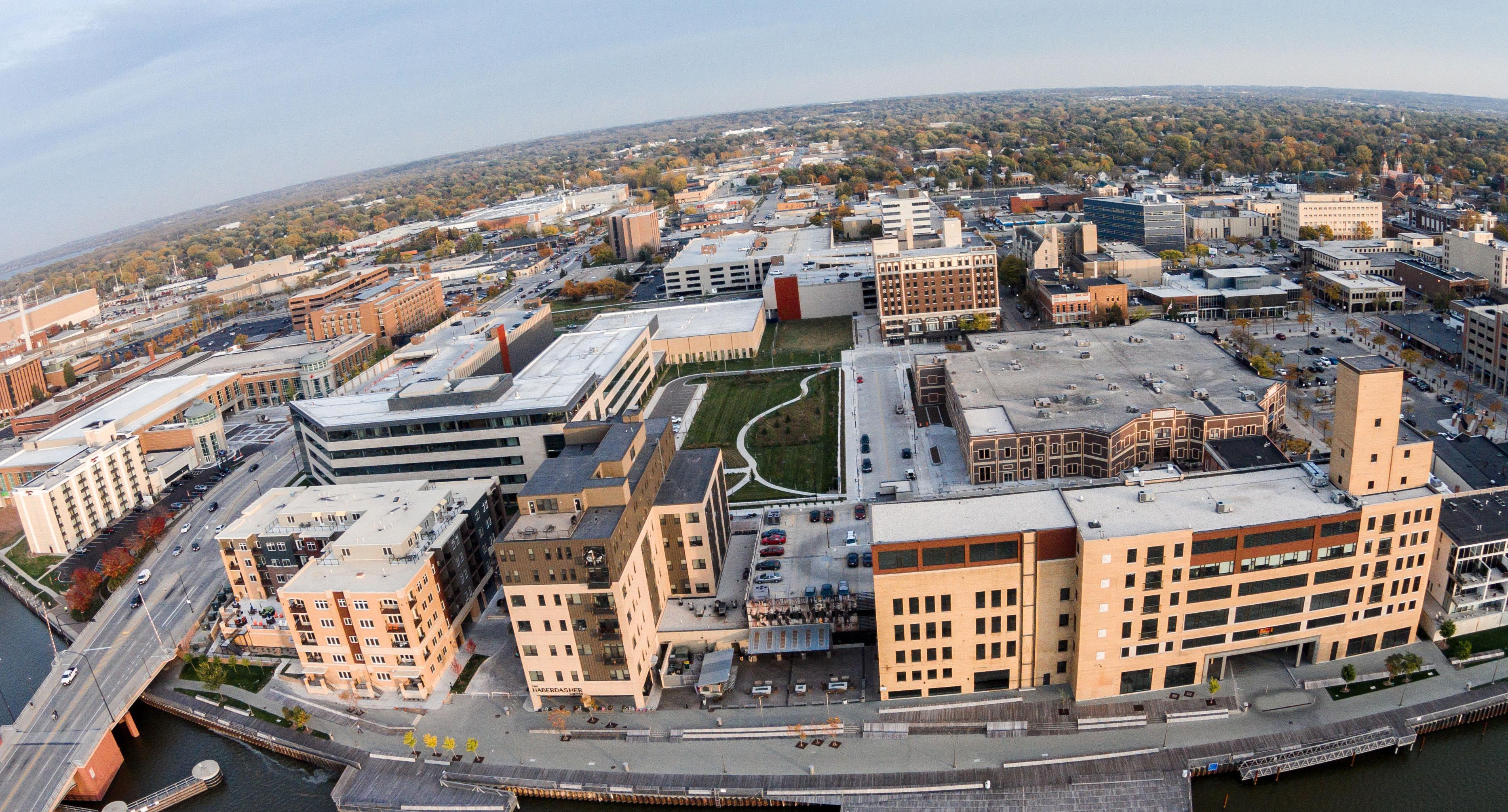
pre-pandemic data from 2018. The following ALICE report will be released in April 2023.
Imagine living on this budget after the pandemic with inflation on the rise. That’s what’s happening to families with young children, the LGBTQ+ community, young veterans, minorities, seniors, and others.
The ALICE report serves as a call to action to support individuals and families in need, stand up against systemic racism and discrimination and reduce and eliminate structural and institutional barriers to economic security. Solutions must focus
on and empower the individuals, families, and communities facing marginalization, uncertainty, insecurity, and injustice.
Everyone should have access to employment with household-sustaining wages, educational opportunities, affordable healthcare, and quality and affordable housing. That’s where Brown County United Way (BCUW) comes to fruition. BCUW is on a journey to stabilize 10,000 individuals in ten years. To be a part of this change – volunteer, advocate, or donate at browncountyunitedway.org. Your investment could support a neighbor on the path to stability.
Issue 4 2022 | Collective IMPACT 9 Social Sustainability
Strategic implementation of the Chamber’s diversity, equity, and inclusion initiatives
By: Maureen Pistone, Diversity, Equity, and Inclusion Taskforce Member

Communities thrive when we bring diverse perspectives, thought, talent, and backgrounds to where we live. Greater Green Bay has a focus on being a diverse and inclusive community. That shared prosperity creates long term, equitable economic success. Key to this vision is a diverse population, improved economic opportunities for existing residents, and continued partnerships with the region’s anchor institutions.
The Greater Green Bay Chamber’s strategic initiatives rely on a diverse Diversity, Equity, and Inclusion (DEI) taskforce and working groups collaborating to deliver this desired community impact. Such working groups include Housing, CEO Pledge, and Small Business. The ongoing work of these groups is possible through a strong Chamber commitment around supporting this work with staff, resources, and innovative partnerships.
On December 6, 2022, the Housing Working Group launched the “Great to Be Home Program” in partnership with the City of Green Bay and NeighborWorks. Great Being Home is a homeownership program serving employees of participating Green Bay employers. The program will help employers attract and retain talent, increase awareness, and resources for homeownership among local employees, increase homeownership rates within the city, and strengthen neighborhoods. Qualified employees may be provided a $5,000 grant and other financial assistance up to $10,000.

The CEO Pledge Working Group focuses on educating Greater Green Bay employers around the benefits of signing the pledge through CEO Action for Diversity and Inclusion, the largest CEO driven business commitment to advance diversity and inclusion in the workplace. The region has 120+ CEO’s who have signed the pledge and join over 2,400 global CEO’s. Four years ago, Kurt Gresens, Wipfli Managing Partner, signed the pledge which guided our commitment to understand how the firm could continuously focus on our culture through the lens of inclusion and belonging.
focuses on the retention and expansion of diverse small businesses and connects them to programs to ensure they receive the assistance needed. This role is the result of a partnership between the City of Green Bay and the Chamber. Maria will help the Chamber further understand the needs of minority owned businesses and take the necessary measures to ensure Greater Green Bay is a community where all businesses thrive and prosper. Here’s to a great start to 2023 and continued success in Greater Green Bay as we all collaborate to create equitable economic success!
10 Collective IMPACT | Issue 4 2022 Social Sustainability
Maria Padilla was hired in late 2022 as the Diverse Small Business Manager. Maria
In December 2022, The Chamber, along with the City of Green Bay and NeighborWorks, announced our partnership to establish the ‘Great Being Home’ Initiative. Pictured from left to right: Tim Carney and Susie Macias with American Foods Group, Mayor Eric Genrich with the City of Green Bay, Chamber President and CEO, Laurie Radke, and Noel Halverson with NeighborWorks Green Bay.



Issue 4 2022 | Collective IMPACT 11 ENDLESS HEALTH OPTIONS FOR A HAPPY WORKFORCE. Prevea offers convenient medical services to inspire employees to get healthy and stay healthy. BEHAVIOR-CHANGING PROGRAMMING INCLUDES: LEARN HOW PREVEA CAN HELP YOUR EMPLOYEES AND BUSINESS. Call (920) 431-1999 Visit prevea.com/results WELLNESS OFFERINGS OCCUPATIONAL HEALTH WELLNESS CENTERS POPULATION HEALTH MGT. WELLNESS EDUCATION • Occupational health, such as pre-placement, DOT exams, injury prevention and post-injury care • Clinical care, such as primary care, urgent care and therapy services • Employee Assistance Program • Health screenings • Health coaching
Delivering with purpose
By: Kara Leiterman, Media Relations Manager, Schneider
Green Bay-based transportation and supply chain leader, Schneider, is leading the charge in sustainability by developing and investing in capabilities and technologies that reduce carbon emissions for its own operations – as well as supporting customers in reducing their emissions.
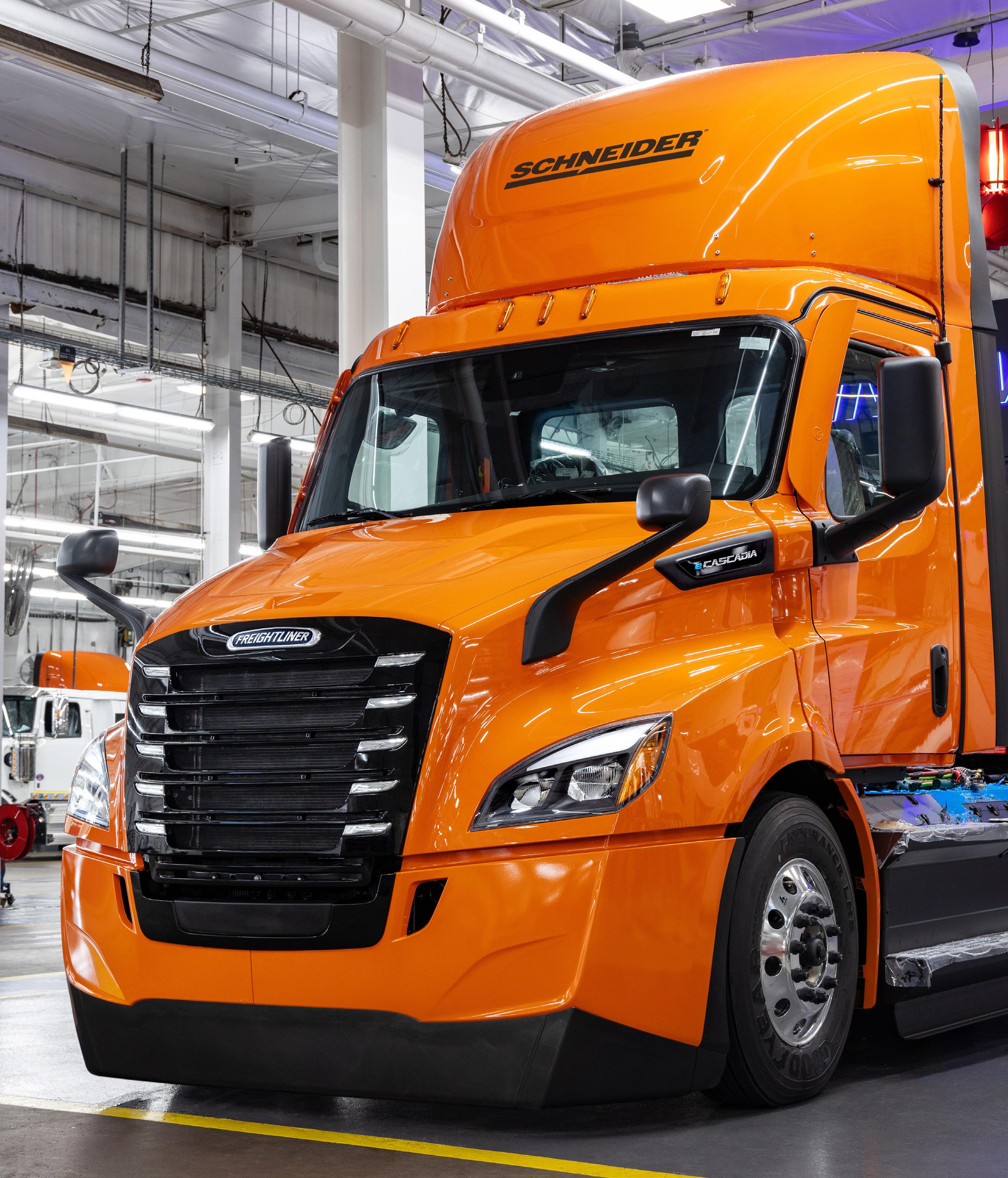
12 Collective IMPACT | Issue 4 2022 Economic Sustainability
Schneider has already achieved more than half of its 2025 goal by reducing per-mile emissions by 5%. Battery-electric trucks (BEVs) will help the company further meet these goals. In 2023, Schneider will add 92 BEVs to its intermodal operations in southern California, making it one of the largest electric truck fleets in North America. Intermodal transportation has been proven to create significant environmental benefits. In fact, a ton of freight can be shipped 500 miles by rail on a single gallon of fuel.
To reduce emissions across the transportation sector, collaboration is necessary. Schneider works with customers to optimize their networks, reduce empty miles, consolidate freight and pick the right mode of transportation. Furthermore, Schneider implements and assesses the use of new technology, equipment, and data science to help customers advance supply chain
sustainability, solve challenges and benefit from efficiency solutions – such as visibility to their carbon footprint. Schneider’s efforts are also recognized beyond the industry; the United States Environmental Protection Agency (EPA) named the company a SmartWay High Performer in 2022 due to its exceptionally efficient and clean fleet. The EPA works with thousands of carriers through the program annually, but only 2% meet the high performer metrics. Additionally, Schneider was awarded the PepsiCo Asset Sustainability Carrier of the Year due to more than 20 years of service and remarkable sustainability commitments in support of the international food and beverage company.
Schneider currently makes an outstanding impact on sustainability nationally, and the company will continue to push the envelope on efficiency and innovation in the years to come.


To focus efforts and meaningfully track progress, Schneider set four ambitious sustainability goals:
reduce
by
Issue 4 2022 | Collective IMPACT 13 WPR Business Sponsorship Good for your community and your bottom line! “We sponsor Wisconsin Public Radio because it is a leader in its field.” -
Learn more at wpr.org/sponsor, or contact Sherry Boushele-Walter at sherry.boushelewalter@wpr.org or 920-810-6841. Economic Sustainability
Tom Boldt, CEO The Boldt Company
achieve a 60% reduction in CO2 emissions per mile. By 2030, double intermodal (shipping by rail) size, thus reducing CO2 emissions by an additional 700 million pounds per year.
2035, carbon neutrality in all companyowned facilities.
By 2025,
CO2 emissions
7.5% per mile. By 2035,
By
Using data and technology to reduce supply chain emissions
By: Jenny Vander Zanden, COO at Breakthrough
Sustainability is emerging as a top priority and more companies are setting science-based target initiatives (SBTi) to act in accordance with the 2015 Paris Agreement. A SBTi is a clearly defined goal that limits global warming to 1.5°C above pre-industrial levels. Yet, a SBTi without a plan of action and support to rally around emissions reduction initiatives faces an arduous journey. Breakthrough, a Green Bay-based strategic transportation management company, launched CleanMile in April 2022, to guide many of the world’s largest shippers’ efforts to reduce transportation carbon emissions.
CleanMile is the first end-to-end transportation emissions management solution that enables shippers to track, plan and execute scope 1 & 3 transportation emissions reduction initiatives. With scope 3 emissions typically comprising 80 to 90% of a
shipper’s entire carbon footprint – and often the most difficult to track and manage – the transportation emissions management tool combines smart technology, robust data, and expert support to enable shippers to make real progress toward their climate targets.
Through Breakthrough’s online FELIX platform, CleanMile receives and processes shippers’ transportation data in real-time, calculating the lifecycle emissions of its transportation network. Through this data analysis, Breakthrough provides emissions reduction recommendations specific to each shipper’s network for things like alternative energy applications, alternative mode choice, and optimized load fill. Breakthrough’s prescient Applied Knowledge team provides this expertise to educate and advance shippers’ networks by being ahead of the curve in the energy, freight, and sustainability markets.
Internally, Breakthrough has taken the pledge to be carbon neutral. In 2019, Breakthrough made the strategic decision to embark on a digital transformation. On April 1, 2022, we culminated the final shutdown of all on-premises data centers by transitioning our computing needs to the Google Cloud. As a result, our scope 1 technology emissions are zero. We have also decided to invest in regional projects to support and offset our energy usage.
The future is clear for Green Bay:
Sustainability is and will continue to be a focus. With an investment in innovative ideas, initiatives, and programs to reduce emissions in our local community and globally, we can make real progress.
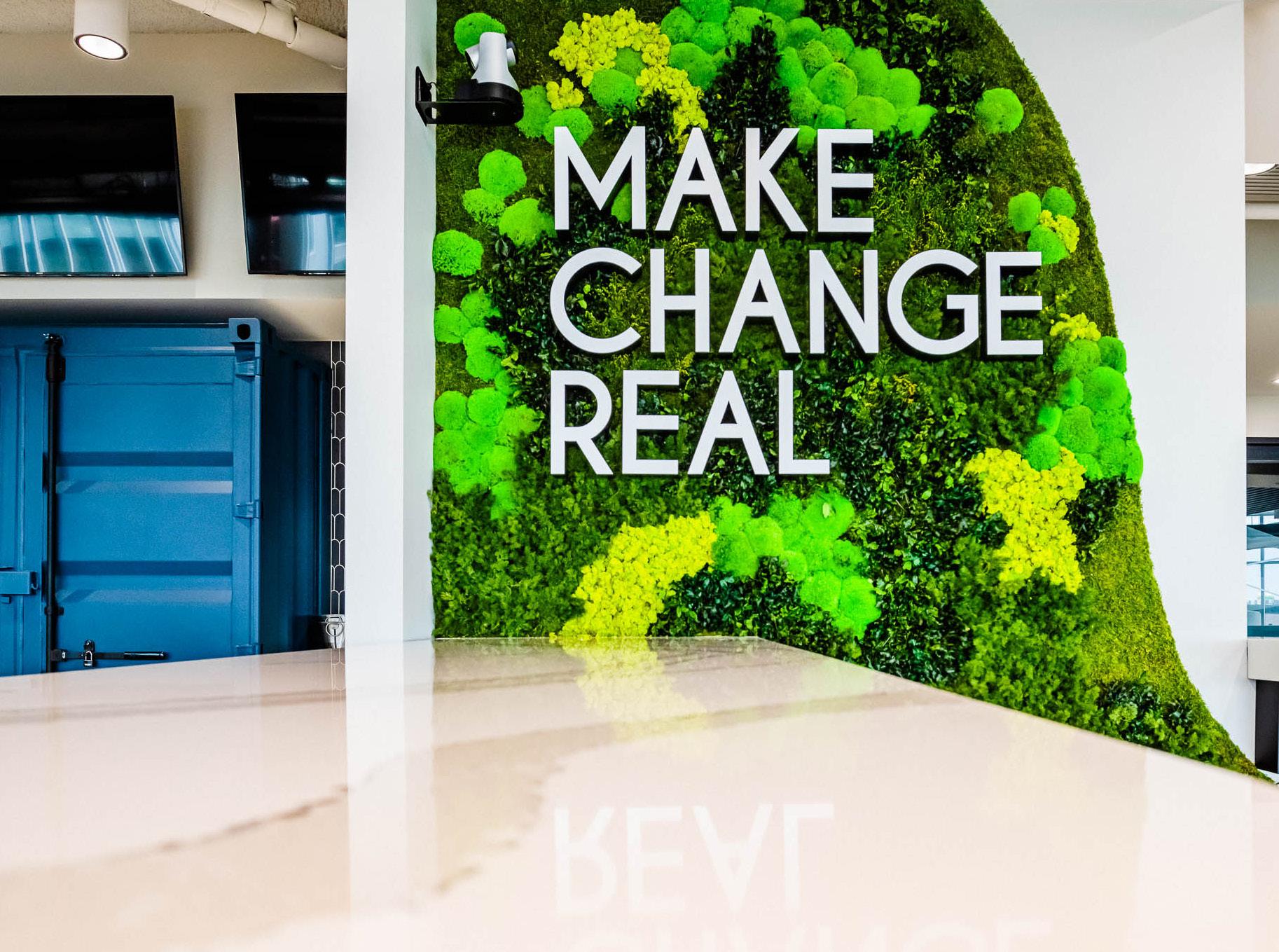
14 Collective IMPACT | Issue 4 2022 Economic Sustainability
Electrifying the community: A sustainable future through education
By: Emily Burger, Operations Manager, Plug Light Bulb
As the world progresses towards a sustainable future, consumers are looking to support companies with goals to better not only their customers, but the environment as well. Many often promise goals out of grasp or not easily measurable, but at Plug Light Bulb, our objective is to educate the community on energy consumption through efficient, cost saving, and high-quality service.
Advancements in our industry provide many options for minimizing consumption, these advancements include lighting upgrades, electric vehicle and solar installs, and general education on the use of electricity. There is no “one-size fits all” approach to being sustainable. That is where we educate, as our goal is not to win a sale, but rather assist the consumer towards the best solution.
The easiest solution is to upgrade your lighting. By switching from fluorescent to LED, you are using at least 75% less energy that lasts up to 25 times longer, according to the U.S. Department of Energy. This also decreases material waste and additional costs on recycling hazardous bulbs, in which many times are not being properly recycled in the first place. Focus on Energy, which partnered with Wisconsin utilities, provides rebates for fluorescent to LED upgrades and is available for business and homeowners. Plug Light Bulb can also provide consultations on measuring consumption of lighting and to ensure consumers get the best and most sustainable install for their needs.

The most popular sustainable solution we offer is electric vehicle (EV) charger installs. Before purchasing the vehicle, we suggest a short consultation to make sure this is an appropriate solution for your needs. There is no doubt emissions have polluted our planet and will continue to affect the earth as it is necessary in most daily lives. In order to make the world a little easier to breathe in, we maintain strong education on the benefits of EV chargers and what we can all do to optimize our transportation waste. We engage with national EV companies and can even provide resources towards getting money back from the EV switch.


One solution that needs more education is solar panel installations. Solar can be the way of the future and by educating home and business owners, we provide solutions towards self-sustainability and renewable resources. Wisconsin utility companies provide kickbacks for using solar and can
even purchase energy from solar consumption. With this, you are actively engaging in reducing your carbon footprint.
Our goal for sustainability is action through education. Regardless of someone’s background, there are always ways to reduce waste and step towards a “greener” future. By providing resources, financial advantages, and being with the customer throughout the whole process, we want to be responsible for the positive, sustainable change we strive to see in the world.
Issue 4 2022 | Collective IMPACT 15 Economic Sustainability
Choices to Save You Money.” Energy.gov, Office of Energy Efficiency & Renewable Energy, https://www. energy.gov/energysaver/lighting-choices-save-you-money.
“Lighting
The nature of business
By: Tara Perre, Director, Corporate Communications & PR, AriensCo
AriensCo has always operated its manufacturing business with as little impact on the environment as possible. Those efforts to reduce waste and minimize impact were typically contained within the walls of the plants. Dan Ariens, Chairman & CEO had never thought about extending his environmental stewardship outside of the operations, until he met Margaret Gorman, president of the Wildlife Habitat Council (WHC) in 2017.
“The mission of WHC is simple. It’s a membership organization focused on engaging corporations across the world to do conservation on their land holdings,” says Ariens. “Corporations own undeveloped land for all sorts of reasons, and if they were managed for conservation, these efforts can add up to a big impact for biodiversity
and native ecosystems when considered collectively.”
At the core of the mission is restoring native habitat. Once native plants are restored, the premise goes, the native wildlife will follow.
Ariens considered the 250 acres between two plants on Highway 10 in Brillion. It was overgrown with unwanted trees and invasive plants, and, it had been used to dump fill from building projects. The section rented as farmland was plagued with drainage issues. It was a typical ‘back-of-plant’ area that exists on many manufacturing properties.
The project received staff support from a cross-section of employees. Ann Stilp, Executive Program Manager, works with the Ariens Outdoors staff, summer interns and production employees who have interest. Using the guidance of WHC and local experts, the team began to eliminate invasive and overgrown plants and trees; seed for native grasses and wildflowers; plant trees for reforestation; convert the farmland; and set up and maintain nest boxes for native bluebirds, tree swallows, purple martins, and wood ducks.
Today, the area is an on-going native restoration success story with three distinct habitats: upland forest, prairie oak savanna and wetlands. Employees and others also conduct monitoring to track native plants and wildlife as a success indicator of the project. This past season, 135 native plants and grasses were identified. They also identified thirty-three native Wisconsin butterflies and 81 species of birds.

In 2020 the company received conservation certification from WHC for its efforts for its Prairie Oak Savanna project. This year AriensCo submitted three additional conservation projects for review.


“It has been amazing how quickly habitat can be transformed with a bit of focus and attention.” says Stilp. “Similar to how we apply management principles to our businesses, WHC provides guidance with the principles and best practices to manage ecosystems.”
The company allows public access to the site with three miles of trails which connect to the Fox River Trail system.
“Businesses may find any number of reasons to get involved with Corporate Conservation efforts,” says Ariens. “For us it was community engagement, talent acquisition and employee engagement and wellness. We wanted to make an impact for generations to come.”
Learn more: www.wildlifehc.org
16 Collective IMPACT | Issue 4 2022 Enviromental Sustainability
Green skies ahead
By: Susan Levitte, Marketing Communications Manager, Green Bay Austin Straubel International Airport

The aviation industry isn’t typically top of mind for sustainability initiatives. The primary industry focus is always safety which requires consistent use of products and principles that are known for their success. But this doesn’t mean that the industry doesn’t care about sustainability, it means innovation is required to adapt.
Green Bay has a long history of aviation innovation. According to the Delta Air Lines Flight Museum Staff, Northwest Airways started flying from Green Bay on December 15, 1928. Those first flights at Blesch field offered passengers the opportunity to reach Chicago in four hours. It likely felt like time travel
even when passengers were required to hold the mail bags in flight.
Today, airlines work closely with aircraft manufacturers to create planes that burn less fuel while carrying more passengers. Green Bay Austin Straubel International Airport (GRB) is seeing this trend, as larger planes are replacing 50passenger models on American, Delta and United. The benefits of a more comfortable trip, less fuel burn, easier staffing, and more seats will help the continued growth of GRB. Passengers of GRB’s two low-cost carriers, Sun Country and Frontier, may not realize that the aircraft flown are part of these airlines business sustainability practices.
Airbus A321 NEO aircraft.
• GRB added the first solar powered electric vehicle charging station, offering a local company the chance to prove its technology while delivering a sustainable passenger amenity.
• Changing light bulbs throughout the terminal to LED options saw immediate results in energy cost savings.
• Recently, GRB became the first airport in the world to receive the Alliance for Water Stewardship (AWS) Standard. This certification is important as GRB continues to implement management practices on airport-owned land, focusing on water runoff, airfield de-icing and other practices, with the goal of maintaining the best possible water quality.
• GRB was awarded an Honorable Mention by the Chicago Department of Aviation at the 2022 Airports Going Green Conference.
Future sustainable projects include installing HVAC equipment that incorporates smart technology, using less energy to keep spaces comfortable.
“It’s an exciting time in the industry,” explained Airport Director Marty Piette, A.A.E. “Technologies that weren’t affordable to airports our size in the past, are becoming attainable and helping meet expectations when it comes to sustainability in travel.”
With GRB passenger travel and cargo arrivals nearing 2019 pre-pandemic levels, meeting the sustainability expectations of airlines, corporations and leisure passengers is more important than ever before. That’s why it will remain a focus as the airport looks to the next 95 years.

Issue 4 2022 | Collective IMPACT 17 Enviromental Sustainability
Not all sustainability tactics are as large as a fuel sipping
Photo Credit: Weston Imaging Group LLC
Paper mill leads water stewardship
By: Lisa Bauer-Lotto, M.S., Corporate Director, Environment & Sustainability, Green Bay Packaging Inc.
For strategic growth, Green Bay Packaging Inc. (GBP) constructed a new 100% recycled paper mill in Green Bay that uses recycled old corrugated containers (OCC) and mixed office paper to produce paper used to make packaging and boxes. The new mill was a substantial investment, not just in the productive capacity of the mill and quality of our products, but importantly in the company’s sustainability efforts. It reflects fidelity to GBP’s deep heritage of environmental stewardship and its commitment to an environmentally sustainable future.
We are seeing a shift in customer and stakeholder interest toward increased sustainability attributes of their products and their desire to align with likeminded sustainable supply chain partners, like GBP. In a visible example of this interest, we have seen a blossom of tours by customers, other paper mills, supply partners, community and education stakeholders that wish to see
first-hand the technology and advanced sustainability performance of the next level for papermaking at our Green Bay mill.


One of these industry leading advancements drawing attention is the mill’s use of “reclaimed” water and its circular water system, where municipal wastewater is recovered and treated by GBP for further reuse. A portion of the Green Bay mill make-up process water is piped from the municipal wastewater discharge (NEW Water) with additional treatment for continued use in our papermaking. The reclaimed wastewater replaces water volume that otherwise would be city’s freshwater (tap water) supply. A water system that fully counterbalances its freshwater demand through the use (and reuse) of reclaimed water is known as a “net zero” water system. The GBP Green Bay mill is the first in the world to achieve third-party validation as a net zero water operation, by United Laboratories (UL). In 2022 alone, the water saving innovation of the circular reclaimed water system and advanced technology reduced use of water from Lake Michigan by more than 200 million gallons. It resulted in 30% less water use per ton of paper production.
Paper mills are water intensive and highly reliant on water sourcing which, makes net zero water use in a papermill setting a seminal achievement. Water as the lifeblood of papermaking, transports the paper fiber through the papermaking process, with the paper starting as 99% water and 1% fiber and the final product consisting of approximately 8% moisture. GBP chose to be more water resilient with reclaimed water use and avoid the need for any direct intake or discharge to the adjacent Fox River. In addition to the efficiency gains and the importance of water stewardship to the company, it was a key decision for the longterm strategy of the mill sustainable water program to incorporate reclaimed water due to the increasing regulatory
uncertainty in this area. Attributed to water treatment removal efficiencies, our reclaimed water system has resulted in 64% less BOD and 73% less TSS per ton of paper production. Using an alternative (reclaimed) water supply also benefits the shared local water resource, protecting water quality.
Paper is a sustainable product of nature sourced from responsibly managed forests. The trees are grown and nurtured like a crop in tree farms. Paper is renewable, recyclable and wood fiber regenerative. The forests have sustainable green attributes during the years of growth absorbing the greenhouse gas carbon dioxide (carbon sequestration) and in final products (carbon storage). For the corrugated packaging industry to remain sustainable we rely on virgin wood fiber inputs; without virgin fiber from trees recycled fiber (paper) would not exist. Boxes can be recycled about seven times– seven lives!
18 Collective IMPACT | Issue 4 2022 Enviromental Sustainability
From left to right: Bob Mihalski, Director of Mill Sales, Trades, and Continuous Improvement, Lisa Bauer-Lotto, MS. Corporate Director, Environment & Sustainability, William Cone, Vice President and General Manager Green Bay Mill Division, Andrew Stoub, Environmental Manager
Advancing water stewardship of paper mill water systems pays homage to the Kress family’s vision, starting with its founder George Kress. The Green Bay mill was the first in the world to have a closed process-water-loop in the early 1990s and was featured in a National Geographic article on The Magic of Paper, March 1997. In 2022, the GBP Green Bay mill was recognized for sustainable circularity and water stewardship on many levels to include the Wisconsin Sustainable Business Council’s 2022 Sustainable Product of the Year, Clean Water Action Council award to Will Kress as Environmental Citizen of the Year and American Forest and Paper Association peer industry award for Leadership in Sustainability.

The success of any good sustainability investment for change should be measured not in awards received but in gallons, energy, and waste. The overall sustainability performance of the mill investment has reduced impacts by 25% less greenhouse gas, 12% less energy, 30% less water and 33% less waste per ton paper production. These reductions are assurance of GBP’s sustainability commitment on transformative manufacturing through product innovation, technology and pioneering ‘out-of-the box’ advancements into our products.

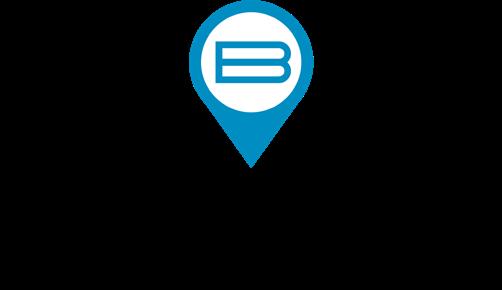
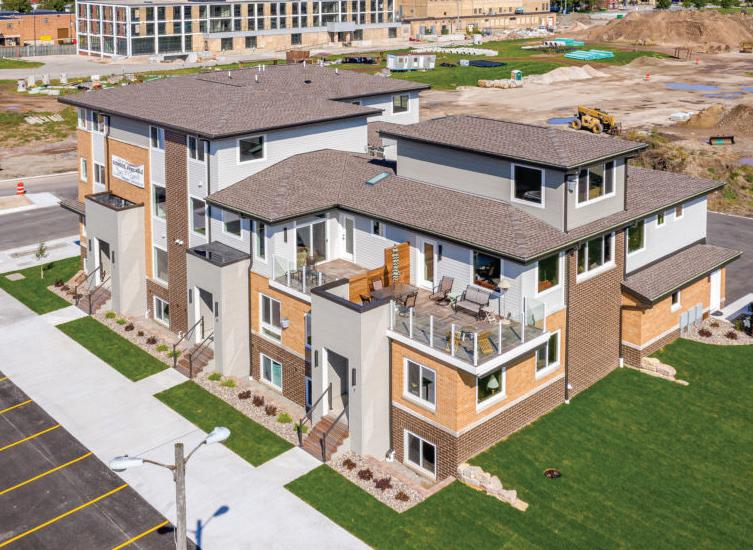


Issue 4 2022 | Collective IMPACT 19 Enviromental Sustainability Work. Live. Grow. Play. Dream. Work. Live. Grow. Play. Dream. 340 N. Broadway, Suite 460 Green Bay, WI 54303 920.764.0835 • 888.227.3815 basecompaniesllc.com
At Miron Construction, our project teams leverage a deep bench of experience to live out our commitment to excellence in everything we do. Engaging multiple stakeholders, partners, technology suppliers, and skilled craftspeople, we rally together and work as a team to get the job done. In the end, what means the most to us is celebrating our successes together, sharing in the sense of accomplishment and comradery we have built along the way.



Together, we are Building Excellence.






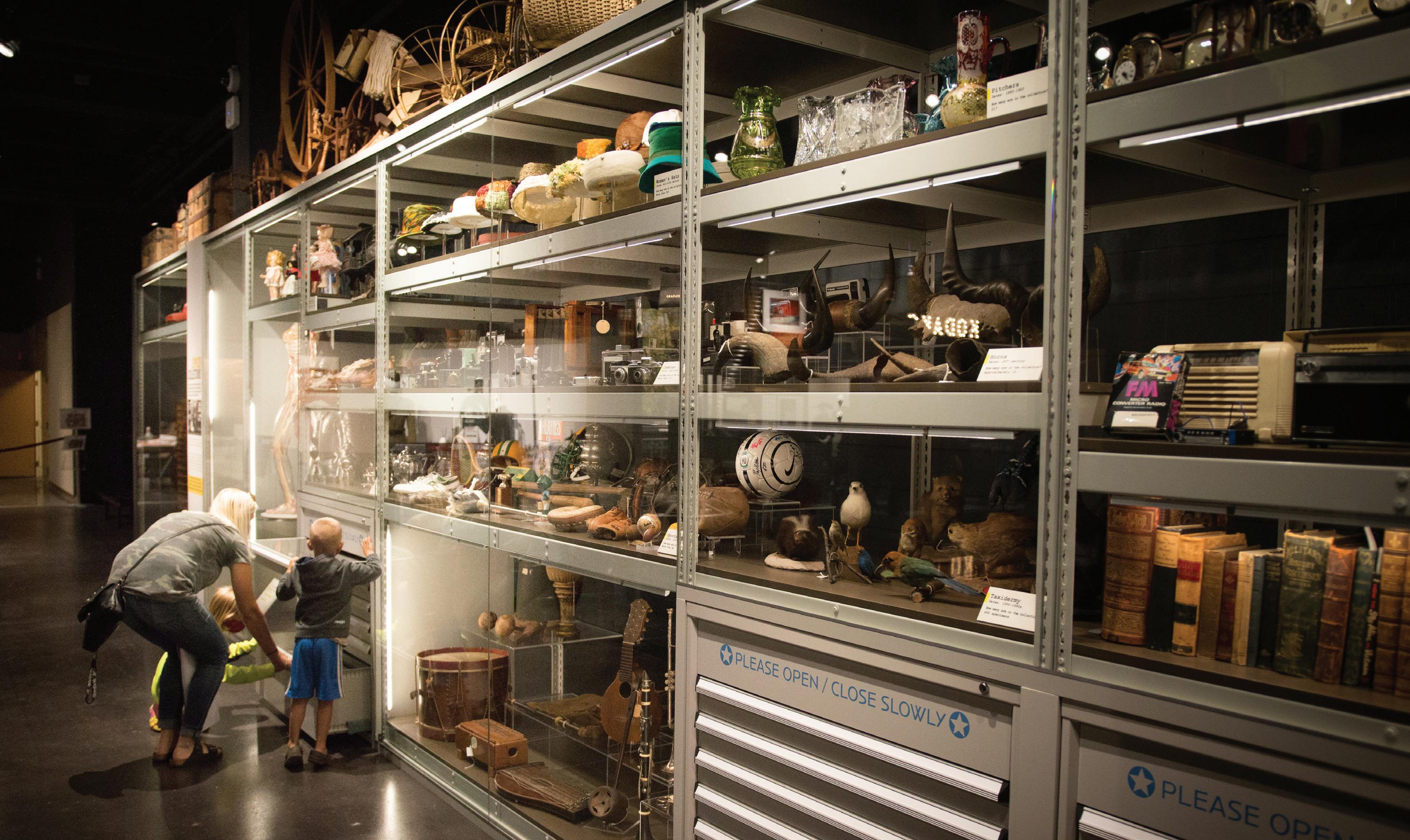

20 Collective IMPACT | Issue 4 2022
LEARN MORE AT MIRON-CONSTRUCTION.COM
An equal opportunity, affirmative action employer
Brown County Organics Biogas Facility GREENLEAF, WI
Sanimax and the original recycling industry
By: Donn Johnson, Vice President U.S. Manufacturing, Sanimax
As a business that specializes in rendering, Sanimax has played a key role in the food supply chain since becoming a member of the Green Bay community in 1881.
Rendering is known as the original recycling industry. Every day Sanimax transports millions of pounds of agri-food by-products representing the roughly 50% of the animal that is considered inedible by U.S. standards. At the Green Bay facility, the by-products are transformed into two main products: proteins that are used to create livestock feed, and fat that is used to make a variety of everyday items including renewable fuel. On an annual basis, Sanimax-Green Bay transforms enough material to fill semitrucks stretching from Green Bay to Orlando, Florida. In the U.S., renderers collect 56 billion pounds of by-products annually. Without the rendering industry, landfills across the U.S. would be filled in approximately four years.
Sanimax is dedicated to reducing the environmental footprint, constantly looking for new ways to make rendering more sustainable. This led Sanimax to finding alternatives to reusing water, which helped reduce water consumption by more than 8.25 million gallons per year. In the U.S. annually, 3.7 billion gallons of water are reclaimed during the rendering process and returned to natural resources.
As Sanimax continues looking for ways to find environmental efficiencies, a
process was implemented to preheat water going to the boiler. The preheated water reduced natural gas consumption. As a result, the amount of natural gas saved is the same as heating 1,500 residential homes for an entire year.

The fat produced during the rendering process is used by companies to make everyday items like tires, wax crayons, lubricants, and more. However, the most prevalent use of rendered fat is to create renewable diesel. In fact, almost 20% of the material used to make these biofuels comes from fats and oils supplied by the rendering industry. Sanimax-Green Bay produces in excess of 75,000 tons of fat annually, which
can be converted into renewable diesel. In the U.S. over 778,000 tons of animal fat contributes to the production of renewable diesel. Cleaner-burning renewable diesel reduces greenhouse gas emissions over 80% compared to fossil fuel-based diesel, which is the equivalent to removing 5.4 million cars from America’s roads.
From creating valuable ingredients from resources that would otherwise be sent to landfills to finding ways to reduce the company’s environmental footprint, Sanimax has a positive environmental impact that plays an integral part in global sustainability and the food supply chain.

Issue 4 2022 | Collective IMPACT 21 Enviromental Sustainability
Dreaming of your new beginning?
Through every new beginning on your life’s journey, Bank of Luxemburg is here to guide the way! With 120 years of experience, our local community bank provides expert guidance, local insights and faster loan decisions—all while keeping your money in the Northeast Wisconsin community as you navigate your path.
Future 15 & Young Professional Awards
Thursday, March 2, 2023, 5 - 8:30 p.m.
Radisson Hotel & Conference Center
This annual event profiles 15 young professionals and awards a Young Professional of the Year, Young Entrepreneur of the Year, and Next Generation Best Place to Work. These honorees are currently influencing the growth, prosperity, and quality of life in Greater Green Bay and demonstrate the ability to positively impact the area in the future through professional accomplishments and community involvement.
30th Annual Golden Apple Awards
920.845.2345

bankofluxemburg.com

Wednesday, April 19, 2023, 5 - 8:30 p.m.
Lambeau Field Atrium
2023 marks 30 years for the Golden Apple Awards in Greater Green Bay. After being inspired by a recognition event in Florida to honor teachers, Donald J. Long, Sr., founder of Imperial Inc. (now Imperial Supplies), began to lay the groundwork for the Golden Apple Awards in 1986. Thanks to his perseverance, the first Golden Apple Awards was hosted in 1993 in Green Bay. This event is one of only three recognition events of its kind nationwide, and with our partnership with WLUK FOX 11, is televised locally.
Pivot Points: The Stories of Business Success

Tuesday, May 2, 2023, 2 - 5 p.m.
Livestream event
Join us for this moth-style storytelling event and hear the pivot stories from seven local business leaders. Each speaker will take 10 minutes to share the details of the moments that defined their professional journey and how they persevered as their world was being disrupted.
22 Collective IMPACT | Issue 4 2022
VIEW ALL EVENTS prophit.com/coaching
development training, technology & coaching
We build confident leaders Leadership
FEBRUARY 2023
30 years
- De Pere Area Chamber of Commerce
- ERC Counselors & Consultants
- Graef-USA Inc.
- Mead & Hunt, Inc.
- Oneida Bingo & Casino
- Renard’s Country Elegance Inc.
- VOS Electric Inc.
25 years
- Amundsen Davis LLC
20 years
- The Business News
15 years
- NEW Zoo & Adventure Park
10 years
- Great Harvest Bread Company
- M3 Insurance
5 years
- CBS-Global LLC, dba Creative Business Services
- Flex-Staff, Inc.
- Green Bay Comprehensive Treatment Center
- North Country Processing LLC
- Tri City Glass & Door, Inc.
- Wells Fargo - Fisk St.
- Wells Fargo - Howard
- Wells Fargo - University Ave.
MARCH 2023
50 years
- Hurckman Mechanical Industries, Inc.
- North Shore Bank
35 years
- Team Crowley Dental
20 years
- Fosber America, Inc.
- Nouryon
15 years
- Community First Credit Union
- MCL Industries, Inc.
10 years
- 1919 Kitchen & Tap
- Almost Family
- Delaware North Sportservice
- NEW Manufacturing Alliance
- The Bottle Room
5 years
- Connections for Mental Wellness
APRIL 2023
25 years
- Bar Stools Direct
15 years
- Cornerstone Mortgage, LLC
- M2 Logistics, Inc.
10 years
- Lin Law LLC
5 years
- Advanced Physical Therapy & Sports Medicine -OSMS
- Advanced Physical Therapy & Sports Medicine-De Pere
- Advanced Physical Therapy & Sports Medicine-GB East
- Salm Partners, LLC VIEW

Issue 4 2022 | Collective IMPACT 23
MEMBER DIRECTORY
OUR





Greater Green Bay Chamber 300 N. Broadway, Ste. 3A Green Bay, WI 54303 Wisconsin’s Hometown Wireless Provider We get you because we are you. That is why we’re committed to providing the clarity you deserve. 1.800.236.0055 www.cellcom.com facebook.com/cellcom














































































